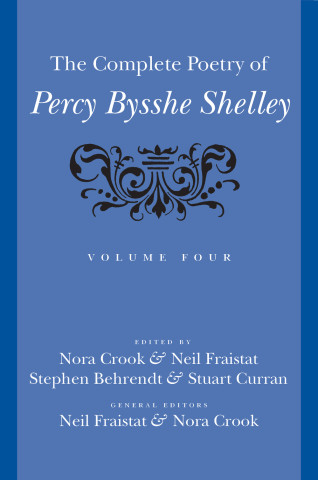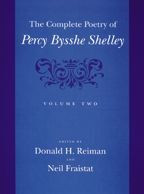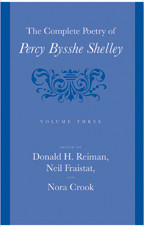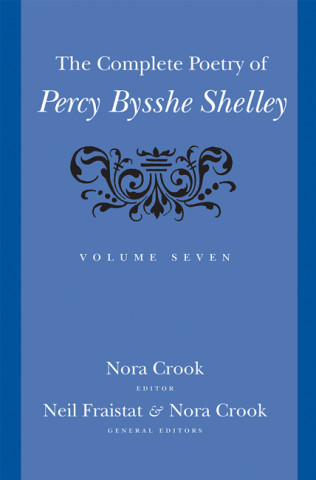
Reviews
The detail and precision of the textual editing here are exemplary: the publication history of the poems, along with the tangled manuscript evidence behind and alongside the original volumes, is dealt with clearly and (when need be) decisively, to produce a hugely authoritative—as well as huge—edition.
Rigorously, enthusiastically, and innovatively edited, this volume has brought excitement and zest to my Shelley-reading life.
With volume seven raising the bar once again, this series is the gold standard for Shelley scholarship. Its expert and illuminating readings are peerless.
Exciting revelations, new connections, and editorial discoveries abound in volume seven, which is testament to the brilliance of one of our greatest scholars and editors of the Shelleys, Nora Crook.
Like the previous [The Complete Poetry of Percy Bysshe Shelley] editions, Crook's latest contribution is both indispensable and delightful, a resource to be prized not only for its careful and authoritative presentation of Shelley's poetry but also for the incisive commentary and contextualization Crook provides throughout....the twin hearts of this edition are, of course, "Texts" and "Commentaries," the former providing the now-definitive texts of each work and the latter a collection of acute analyses that represents the lion's share of this volume's thousand pages. In a slight but useful departure from the earlier volumes in this series, each commentary opens with a headnote that provides item-specific notes as well as information about the text's genesis and transmission and critical history.
CPPBS 7 is set to become a model for editing modern poetry manuscripts. It strikes a difficult balance between philological rigor and scholarly comprehensiveness on the one hand and readability and usability at different levels of expertise on the other. Textual critics and students of Shelley's poetry will find it equally indispensable, but it will also serve as an important reference work for Mary Shelley scholars.
This outstanding installment of an epoch-making edition of Shelley's verse will transform the opportunities afforded to emerging Shelley scholars.
The detail and precision of the textual editing here are exemplary: the publication history of the poems, along with the tangled manuscript evidence behind and alongside the original volumes, is dealt with clearly and (when need be) decisively, to produce a hugely authoritative—as well as huge—edition.
This latest installment of The Complete Poetry is nothing less than a landmark in Shelley studies: comprehensive and reliable, necessary and illuminating.
This is a critical volume of Shelley's works for the twenty-first century—in short, a scholarly masterpiece. No academic library should be without it.
[I]t is tremendously exciting to have access to a resource that provides such an intimate look into the poet's world and his creative process.
An indispensable reference work for all who study Shelley.
What makes this volume so exceptional (like its predecessors) is not only the state-of-the-art editing, but also the knowledgeable commentaries that give information on the poems' composition, possible sources and influences, publication, and most welcome, their reception history.... This gigantic editorial project cannot be praised highly enough.
Will almost certainly be the standard in Shelley scholarship.
A monumental edition—the Shelley edition for our time.
A scholarly delight.
In gathering together all his earliest pieces, including some that have been unavailable in standard editions of the collected poetry, Donald Reiman and Neil Fraistat's meticulously edited volume brings out the aims Shelley had for his verse, and the effects he sought, which remained surprisingly uniform.
If ever an edition deserved the chimerical epithet 'definitive' this is it. A more comprehensive collation of relevant materials, or a more sensitive, sensible, and reader-friendly presentation of evidence, is inconceivable. All Shelleyans owe Reiman and Fraistat a debt of gratitude. The edition this volume inaugurates will be an essential acquisition for academic libraries and should become the standard scholarly reference for all citations of Shelley's poems.
This edition will undoubtedly be indispensable for the serious study of Shelley's poetry.
These youthful poems prove that Shelley's enthusiasm for political solutions to moral problems was neither intellectual fakery nor aristocratic affection.
Donald Reiman and Neil Fraistat bring to their new edition an unrivaled knowledge of the textual evidence and a superb grasp of the important historical and critical issues. Their presentation of and commentary on the poetry Shelley produced up through his elopement with Mary Wollstonecraft Godwin in July 1814 is clarifying and revealing in itself and encourages the highest possible expectations for the volumes to follow. Their editorial principles, centered around the objective of offering critical redactions of single versions of all the poems arranged chronologically in the order in which Shelley released these versions to a particular public, are scrupulously conceived and meticulously applied. Scholars, students, and general readers of Shelley's poetry have reason to celebrate.
Quite possibly the most significant publication among this year's Romantic studies, The Complete Poetry of Percy Bysshe Shelley, Volume Seven, edited by Nora Crook, is a magisterial scholarly edition of Shelley's posthumously published poems, including "The Triumph of Life" and many other fragments that Mary Shelley first edited, including some of his most beloved shorter lyrics. Part of the ongoing editorial project now directed by Crook and Neil Fraistat, Volume Seven arrives as a stunning and indispensable book, modeling both textual stewardship and critical acumen.
[T]his volume is a triumph, it is breathtaking, it is monumental, it is a summa.
To call this edition magisterial is to fall back on too lax a term of praise: it is rather a monument of precise, assured erudition in total command of the poems and almost two centuries of commentary on them, an awesome achievement that as it unfolds will replace all previous texts of Shelley's poetry as well as the whole of their contexts. I cannot imagine it being done by anyone else—or, for that matter, better.
The Complete Poetry of Percy Bysshe Shelley is a much needed work and Reiman and Fraistat are the best possible people to have done it. The research, knowledge, experience, and general thoughtfulness that have gone into the project are truly impressive. It will be a landmark event of Shelley scholarship.
Book Details
List of Illustrations
Acknowledgments
Editorial Overview (by the volume and associate editors)
Abbreviations
TEXTS
Rosalind and Helen, A Modern Eclogue; With Other Poems (edited by Stuart Curran), by
List of Illustrations
Acknowledgments
Editorial Overview (by the volume and associate editors)
Abbreviations
TEXTS
Rosalind and Helen, A Modern Eclogue; With Other Poems (edited by Stuart Curran), by Stuart Curran
Advertisement
Rosalind and Helen
Lines Written Among the Euganean Hills, October, 1818
Hymn to Intellectual Beauty (1819 Version)
Sonnet. Ozymandias
Julian and Maddalo. A Conversation (edited by Nora Crook), by Nora Crook
Preface
Julian and Maddalo. A Conversation
The Cenci. A Tragedy, in Five Acts (edited by Stuart Curran), by Stuart Curran
Dedication
Preface
The Cenci
Supplement: "Note on Shakespeare" (edited by Nora Crook), by Nora Crook
The Mask of Anarchy Written on the Occasion of the Massacre at Manchester (edited by Stuart Curran), by Stuart Curran
Supplements (edited by Nora Crook), by Nora Crook
1. "Horses, oxen, have a home"
2. "From the cities where from caves"
Peter Bell the Third (edited by Stephen Behrendt), by Stephen Behrendt
Dedication
Prologue
Peter Bell the Third
Supplements (edited by Nora Crook), by Nora Crook
1. "A daughter mother & a grandmother"
2. "Proteus Wordsworth who shall bind thee"
3. "A Poet of the finest water"
4. "Sucking hydras hashed in sulphur"
5. "There was a gorgeous marriage feast"
6. "At the creation of the Earth"
Two Political Poems of Late 1819 (edited by Stephen Behrendt), by Stephen Behrendt
To S. and C.
Supplements (edited by Nora Crook), by Nora Crook
1. "Wolves & death-birds have been shot"
2. "Come, da una avita quercia"
England in 1819
Lyrics Given to Sophia Stacey, Winter 1819–Spring 1820 (edited by Nora Crook), by Nora Crook
"Thou art fair, and few are fairer"
Love's Philosophy ("The fountains mingle with the river")
"The Fountains mingle with the River"
An Anacreontic ("The Fountains Mingle with the River")
Time long past
Goodnight
On a dead Violet To ——
Athanase A Fragment (edited by Nora Crook), by Nora Crook
Supplements: Athanase Draft
1. "Prince Athanase as with long toil and travel"
2. "Prince Athanase had one beloved friend"
3. "'Twas at that season when the Earth upsprings"
Lyrics for "Julian and Maddalo, and other Poems" and Poem to Accompany The Cenci (edited by Nora Crook), by Nora Crook
To —— [Constantia] (notebook version of November—1815)
Lyrics for "Julian and Maddalo, and other Poems"
Ollier Booklet
November—1815
Supplement: "That time is gone for ever—child—"
Misery.—a fragment
Supplement: Draft fragment stanzas of Misery.—a fragment
Stanzas Written in Dejection—December 1818, near Naples
To a faded violet
Woodberry MS
To —— [the Lord Chancellor]
Supplements:
1. "By thy most impious Hell and all its terror"
2. "I had two babes—a sister & a brother"
Poem to Accompany The Cenci
Woodberry MS
To —— ("Corpses are cold in the tomb")
COMMENTARIES
Rosalind and Helen, A Modern Eclogue; With Other Poems (by Stuart Curran), by Stuart Curran
Rosalind and Helen
Lines Written Among the Euganean Hills, October, 1818
Julian and Maddalo. A Conversation (by Nora Crook), by Nora Crook
The Cenci. A Tragedy, in Five Acts (by Stuart Curran) (Supplement by Nora Crook), by Stuart Curran and Nora Crook
Peter Bell the Third (by Stephen Behrendt) (Supplements by Nora Crook), by Stephen Behrendt and Nora Crook
Two Political Poems of Late 1819 (by Stephen Behrendt) (Supplements by Nora Crook), by Stephen Behrendt and Nora Crook
To S. and C.
England in 1819
Lyrics given to Sophia Stacey, Winter 1819–Spring 1820 (by Nora Crook), by Nora Crook
"Thou art fair, and few are fairer"
"The Fountains mingle with the River" (three versions)
Time Long Past
Goodnight
On a dead Violet To ——
Athanase A Fragment (and Supplements) (by Nora Crook), by Nora Crook
Lyrics for "Julian and Maddalo, and other Poems" and Poem to Accompany The Cenci (by Nora Crook), by Nora Crook
Lyrics for "Julian and Maddalo, and other Poems"
To —— [Constantia] (notebook version of November—1815)
Ollier Booklet
November—1815 (and Supplement)
Misery.—a fragment (and Supplement)
Stanzas Written in Dejection— December 1818, near Naples
Woodberry MS
To —— [the Lord Chancellor] (and Supplements)
Poem to Accompany The Cenci
Woodberry MS
To —— ("Corpses are cold in the tomb")
HISTORICAL COLLATIONS
Rosalind and Helen
Lines Written Among the Euganean Hills
Julian and Maddalo
The Cenci
The Mask of Anarchy
Peter Bell the Third
Two Political Poems of Late 1819
Lyrics Given to Sophia Stacey, Winter 1819–Spring 1820
Athanase
Lyrics for "Julian and Maddalo, and other Poems" and Poem to Accompany The Cenci
APPENDIXES
A. Mary W. Shelley's Notes from Her 1840 Edition of The Poetical Works of Percy Bysshe Shelley
I. Note on The Cenci
II. Note on the Poems of 1818
III. Note on the Poems of 1819
B. The Cenci: Ancillary Material
I. Shelley's Reading Notes for The Cenci
II. Mary W. Shelley's 1819 Translation, "Relation of the Death of the Family of the Cenci"
III. Shelley's Corrections to the Taaffe Copy of The Cenci
IV. The Cenci Errata List in MWS's hand
Index of Titles
Index of First Lines
Editor Biographies
Notes
Index





